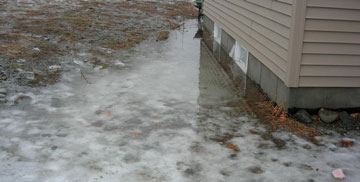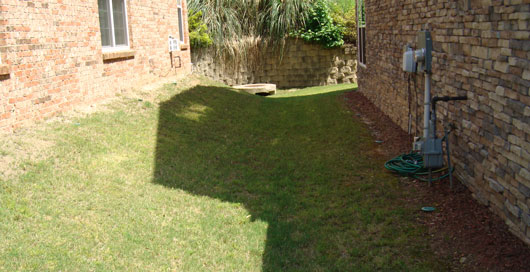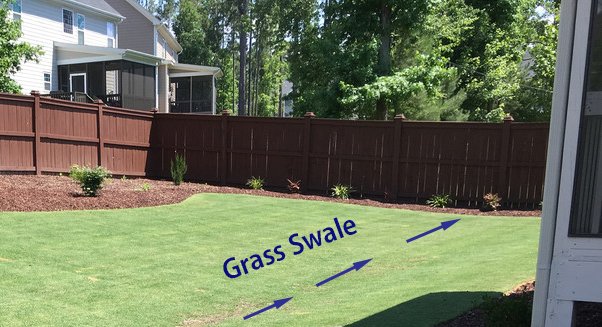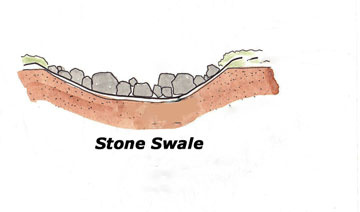For service in the Atlanta, Georgia area contact or call us:
Yard Drainage Problems
in Atlanta, Georgia
Yard drainage problems can be challenging to understand and know how to solve. Water wants to do its own thing.
Let's discuss drainage systems for yards and simple solutions that remove water from wet yards. What are the best drainage systems for yards?

Does Poor Stormwater Drainage Devalue Properties?
Wet
yards devalue your home's value and are a nuisance. The good news is that they
are fixable. I will explain some of the most straightforward systems for
improving yard stormwater drainage issues.
In Atlanta, the drainage experts estimate that 60 percent of homeowners have water
problems in their yards. When purchasing a new home, homeowners rarely consider
that the yard might be a problem. They look at the kitchen and the master
bedroom but hardly ever explore possible drainage issues. It is only after a
few rain events that they discover they have a drainage problem.
Advising homeowners about yard drainage problems has helped us to understand these
problems and how to solve them. Let's look at some ways you can solve your drainage problems.
Ground Settlement Against the
Foundation of Your Home
One of the most common problems I have investigated in the past 25 years is stormwater pooling against the house's foundation.
Why do yard drainage problems exist for so many homeowners?
It
starts with the grading of the yard during the construction of the house.
The first step is to excavate for the footings and the foundations. The excavation
allows space for workers to construct the forms for the foundation wall. The contractor
pours concrete for the foundations and backfills around the foundation with
soil. Too often, the contractor backfills the foundation with loose soil.
Rarely is the soil appropriately compacted. And over time, the ground against
the foundation settles, and water flows against the foundation.
Later,
the landscape company plants shrubs around the perimeter of the house. The shrubs
and plants make correcting the sunken soil around the foundation difficult and
expensive.
Building codes for Atlanta require a slope to direct water away from the foundation.
The ground should slope a minimum of six inches in the first ten feet. This slope
ensures that the water will not drain to the foundation but away from the
foundation. Good grading contractors always provide adequate drainage by following
the building code which prevents yard drainage problems.

How to Construct Grass and Rock Swales
Another standard construction method is to construct grass and rock swales to direct stormwater away from the house.
Grass
and rock swales are shallow ditches for conveying stormwater. Swales collect
stormwater and carry the water to an appropriate discharge point. Properly designed swales intercept stormwater and
direct the water to an exit point.
Drainage swales are shallow, U-shaped grass or rock ditches constructed to collect
surface stormwater. They vary in width and depth depending on the amount of
stormwater.
Designers use grass swales when the quantity of flow is small and the water's
velocity is slow. Rock swales work best for greater flow and higher flow rates
of water. We construct them with sufficient capacity and slope to carry the
stormwater away from the house.
The discharge point should not create drainage issues for the neighbor's property. Always be aware of where the water discharges. Take precaution to ensure that the discharge location will not affect the downstream neighbor.
Drainage systems for yards also include the stone swale. Stone swales are very popular with homeowners.
 |
 |
Protect Your Foundation
Water
is an enemy of building foundations, and any measure you can do to prevent
water from reaching the foundation will help protect your home. Water that sits
against your foundation will eventually seep into your basement or crawl space.
Water damage experts recommend drainage systems for yards to drain water away
from house foundations.
Gutters and downspouts serve an essential function for carrying water from the
roof to the ground. Never allow water from a downspout to splash directly onto unprotected
ground surfaces. The water from the downspout will erode the yard and create
pockets in which water will stand. Standing water will seep into the ground and
saturate the soil around the foundation. Eventually, the water will seep
through the concrete walls.
Standing water around your home is never a welcome sign. They often become a
habitat for mosquitoes. Mosquitoes are more than a yard drainage problem issue.
Yard Drainage Problems
Require Professional Assistance
Seek out a stormwater specialist with experience in residential yard drainage problems. Civil engineers have hydrology training and can advise homeowners about their yard-stormwater drainage problems.
If you need on-site consultation, call us at Atlanta Engineering Services. We have been designing drainage systems for yards and evaluating drainage problems for more than 25 years. We provide consultation to homeowners about stormwater drainage issues.
We are certified by the American Institute of Hydrology.
More Information About Yard Drainage Problems
Find a Drainage Specialist for drainage consultation
Yard Drainage Problems Devalues Property
Simple Solutions to Residential Drainage Problems
Learn the Benefits of Stormwater Drainage Swales
Solving Wet, Soggy Yard Problems
Common Drainage Problems of Homeowners
Preventing Crawl Space Drainage Issues
Do you have a Groundwater Spring on your Property?
Stormwater Damage from the Property Upstream
Stormwater Utilities and Detention Ponds
Forensic Hydrologist Evaluates Stormwater Runoff
Hydrology Expert Contact Information
Additional Services by Atlanta Engineering Services
G-ZNJ8QW23K9
